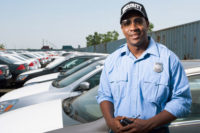Despite the gravity of what security personnel potentially face each and every day, popular culture delights in depicting them in a comical light. Reality shows and films provide light-hearted fun and entertainment, but in no way personify the real world of security officers on the job.
Addressing negative stereotypes and working to change perception is important. This is why I shudder when security personnel are labeled as “guards.” The word “guard” does not convey the level of respect, professionalism and training necessitated of today’s security professionals. Abandoning verbiage that highlights the use of the word “guard” moves the entire security industry forward and reinforces the important reality that security officers protect people, property and assets and deserve our applause and respect.
The Freedonia Group reports that the “demand for security officer and patrol services is forecast to rise at an annual rate of 4.6 percent through 2014 to $25.0 billion and the number of officers employed by private security firms is expected to increase 2.6 percent per year to 740,000 in 2014.” The rapid rise of this sector demands a dramatic shift in public perception about this critically important job. As the security officer sector is growing rapidly, the need for our country’s officers to be comprehensively trained and respected is vital.
These hard-working, highly trained men and women are our country’s first responders who have a wide range of skills – from the sensitivity to deal with lost children to the ability to respond to and effectively address criminal activity. Security officers are often put in high-risk situations as they confront and detain criminals engaged in theft, trespassing, gang activity and other unlawful behavior.
Real world security officers work in partnership with local law enforcement, and some security officers have previously served in law enforcement and military positions.
State-of-the-art training is crucial in keeping the flourishing physical security workforce ready and able to take on the daily challenges they face. Nowhere is technology’s power more visibly demonstrated than with training that educates, empowers and connects the vital security officer sector.
Post-9/11 officers use advanced integrated security solutions based on trace detection equipment and X-ray screening systems. These systems, managed by trained security officers, help safeguard those on the front line and the public at large – protecting buildings and transportation systems, and screening everything from a ticket to a truck.
Customers, employees and visitors are comforted by seeing security personnel on the job. Keeping Americans safe and secure during volatile economic times requires a partnership between security providers and the communities and commercial institutions that they serve.
The next time your path crosses with a security officer, consider thanking him or her for keeping your environment safer and more secure. While Hollywood will likely continue to paint security officers as comedic and inept caricatures with delusions of grandeur, most “real world” people find comfort and satisfaction in knowing that trained security professionals are on the job and watching out for their safety. Protecting our lives and our welfare, security officers deserve our respect and the officer moniker.


